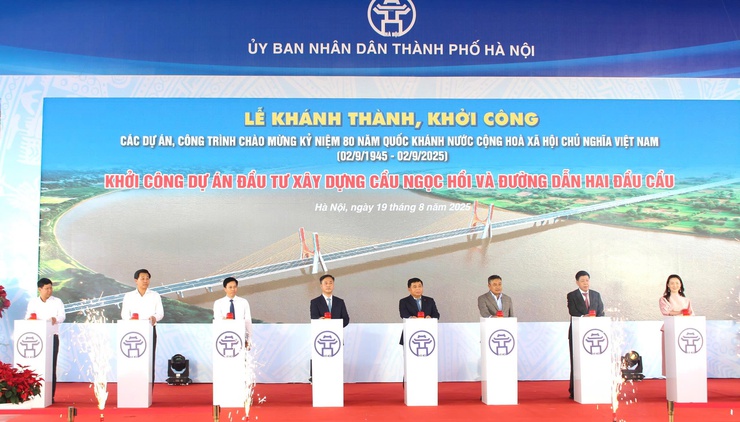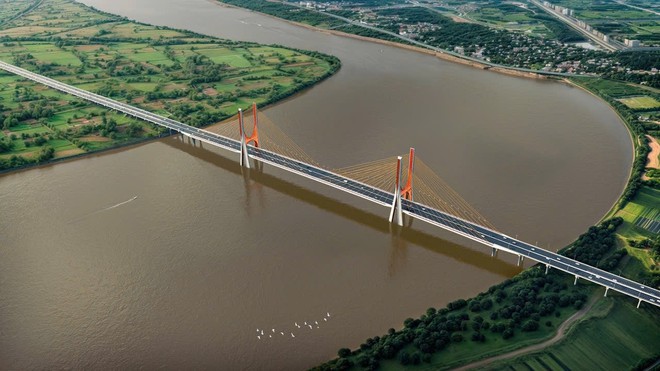Attending the ceremony at Bat Trang were Nguyen Chi Dung, Deputy Prime Minister and member of the Party Central Committee, and Tran Sy Thanh, Deputy Secretary of the Hanoi Party Committee and Chairman of the Hanoi People's Committee.
Also present were Duong Duc Tuan, a member of the Hanoi Party Committee's Standing Board and Vice Chairman of the Hanoi People's Committee, as well as representatives of relevant central and municipal agencies.

Delegates at the event.
Strengthening economic, cultural, and tourism exchange across the Red River
Speaking at the groundbreaking ceremony, Chairman Tran Sy Thanh stated that the event was part of the nationwide campaign marking the 80th anniversary of National Day, with 250 projects launched or inaugurated across the country.
He said that the Hanoi People's Committee was proud to break ground on the Ngoc Hoi Bridge and approach roads as part of this celebration.
Currently, Hanoi has eight bridges crossing the Red River. Ngoc Hoi Bridge is one of seven major bridges planned for groundbreaking in 2025 to enhance Hanoi's regional connectivity.
The bridge carries significant political and economic importance. It will strengthen connections between Hanoi and Hung Yen Province, contributing to national defense and security, while also promoting economic and cultural exchange, urban growth, and tourism on both sides of the Red River. It will also support Hanoi's economic growth target of over 8 percent in 2025 and double-digit growth in subsequent years.
Chairman Thanh reported that the Ngoc Hoi Bridge and approach roads will extend about 7.5 kilometers. Of this length, approximately 5.2 kilometers will lie within Hanoi, including a 680-meter-long main bridge with a 350-meter cable-stayed span and towers 126 meters high.
The section in Hung Yen will measure about 2.3 kilometers, consisting of approach and parallel roads. The bridge will be 38 meters wide with six lanes for motor vehicles and two mixed-use lanes. The total investment is estimated at VND11.844 trillion (about US$465 million), funded by both the Hanoi and central budgets, with completion expected in 2028.
"After just four months of preparation, the Ngoc Hoi Bridge project has met all conditions to begin construction. Completing all preparatory steps for a Category A project in such a short time is a record and demonstrates the determination of the Party, government, and people of Hanoi to achieve progress alongside the nation," Thanh stressed.

The design of the bridge.
On behalf of the city's leadership, Thanh expressed sincere gratitude to the leaders of the Party, the State, the National Assembly, the Government, and central ministries.
He also praised Hanoi's departments, the project investor, consulting units, local authorities, and residents for their support in site clearance, which enabled the project to start on schedule.
Following the ceremony, he urged the project investor and all participating units to heighten their responsibility, mobilize resources, accelerate construction, and ensure technical quality, safety, and progress so that the project contributes meaningfully to Hanoi's sustainable development goals.
Improving transport conditions and connectivity
At the ceremony, Ngo Ngoc Van, Director of the Hanoi Project Management Board for Transport Construction, noted that the Ngoc Hoi Bridge is crucial for completing the Ring Road 3.5 route, which will directly connect Hanoi with Hung Yen Province. The project will also link with Hanoi's radial road system, including Me Linh Urban Axis, Tay Thang Long Axis, National Highway 32, Thang Long Boulevard, Le Van Luong, National Highway 6, National Highway 1A, and the Phap Van–Cau Gie Expressway.
The new bridge will redistribute and ease traffic flows, reducing pressure on existing roads such as Ring Road 3, Giai Phong (National Highway 1A), and Road 70, by preventing vehicles from the north and northwest from having to pass through central Hanoi to reach the southeast.
Most importantly, it will improve Red River crossings, accelerate urbanization, and support population resettlement to ease congestion in central Hanoi. It will also help relieve pressure on existing bridges, including Chuong Duong, Long Bien, Nhat Tan, Thang Long, and Vinh Tuy.
The bridge will contribute to completing Hanoi's overall urban and transport planning, enhancing security and defense, and developing modern urban spaces on both sides of the Red River. It will strengthen regional linkages between Hanoi and Hung Yen, while also improving the cultural and social life of local communities.
"This project is symbolic. It lays the foundation for developing eco-tourism and boosting economic and cultural exchanges between Hanoi and Hung Yen," Van emphasized.
The Ngoc Hoi Bridge, with its cable-stayed design and dual towers shaped like the letter "H," symbolizes harmony and cooperation between Hanoi and Hung Yen. The architectural design, called the "Sun Gate," represents a welcoming gateway for the rising sun. Once completed in 2028, the bridge will become one of the iconic structures shared by both Hanoi and Hung Yen.
The site clearance component projects across five communes—Thanh Tri, Nam Phu, and Bat Trang in Hanoi, and Phung Cong and Van Giang in Hung Yen. These components have a combined investment of about VND784 billion (around US$31 million). The Hanoi Project Management Board for Transport Construction is the project owner.
Hanoi's role in nationwide development
Out of the 250 projects inaugurated or launched nationwide on August 19 to mark the 80th anniversary of National Day, Hanoi accounts for nine projects, or about 4 percent of the total. However, these projects represent nearly 20 percent of the total national investment capital. This not only reflects the large scale of Hanoi's investments but also underscores its role as the nation's leading economic and political center.
Among these projects, the Ngoc Hoi Bridge stands out with its investment of more than VND11.8 trillion (about US$464 million). Another highlight is the Hanoi Biotech High-Tech Park, which covers nearly 200 hectares.
All of Hanoi's projects are being implemented under the close and decisive direction of the city's leadership, with Thanh personally overseeing progress, addressing obstacles, and requiring departments and localities to prioritise quality and timeliness.
Thanks to this determination, Hanoi has promptly launched and inaugurated key projects on schedule, ensuring they directly benefit citizens while also serving as meaningful political achievements to celebrate the 80th anniversary of the August Revolution and National Day.